
This study shows that ICT regulation has had a measurable impact on the growth of global ICT markets over the past decade. The analysis uses econometric modelling to pinpoint the impact of the regulatory and institutional frameworks on the performance of the ICT sector and its contribution to national economies. The modelling has allowed to capture fresh insights backed by authoritative data on the evolution of ICT regulation since 2007, the ICT Regulatory Tracker, and a global dataset on ICT markets economics. The new analysis points to regulatory features that can have a multiplier effect on ICT markets and consumer benefits. For the mobile sector, open and collaborative regulatory policies appear to have a strong positive impact on investment. In turn, more investment triggers coverage gains and lower consumer prices, boosts ICT adoption and generates growth in national economies around two years after policy adoption.
Read More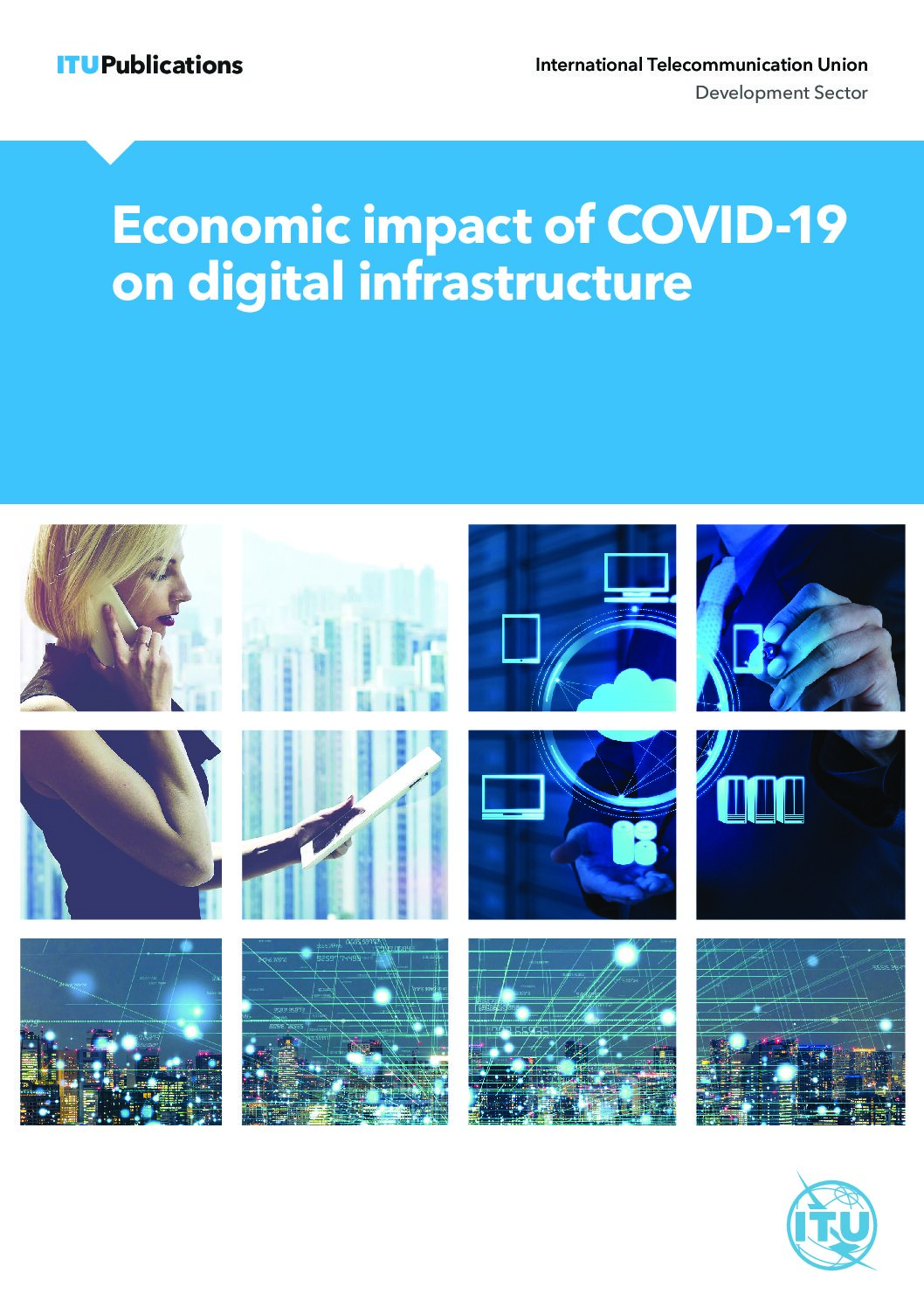
Around the world, COVID-19 has upended lives and economies. Global analysts predict that the world may be facing its deepest recession since the end of World War II. At the same time, the pandemic has highlighted the crucial role of digital connectivity in keeping our societies functioning, as online everything quickly became our new way of life. Despite the surge in digital demand, however, important parts of the digital economy may not have escaped the economic fall-out from the crisis. If the financial difficulties faced by some market players constrain much-needed investment in digital infrastructure, the societal and economic consequences could be long, and far-reaching. Table of contents Economic impact of COVID-19 on digital infrastructure Acknowledgements Foreword List of tables and figures Executive summary Introduction 1. The impact of COVID-19 on digital infrastructure 1.1. Impact on telecommunication networks 1.2. The impact on the digital economy 2. Does digital infrastructure increase social and economic resilience? 2.1. State of research regarding the contribution of digital infrastructure to resilience in the face of pandemics 2.2. Limits to the capacity of digital infrastructure to increase resilience in the face of pandemics 3. Industry implications 3.1. The role of governments 3.2. A need to re-examine capital investment of telecommunication operators 3.3. An acceleration of the digitization of production
Read More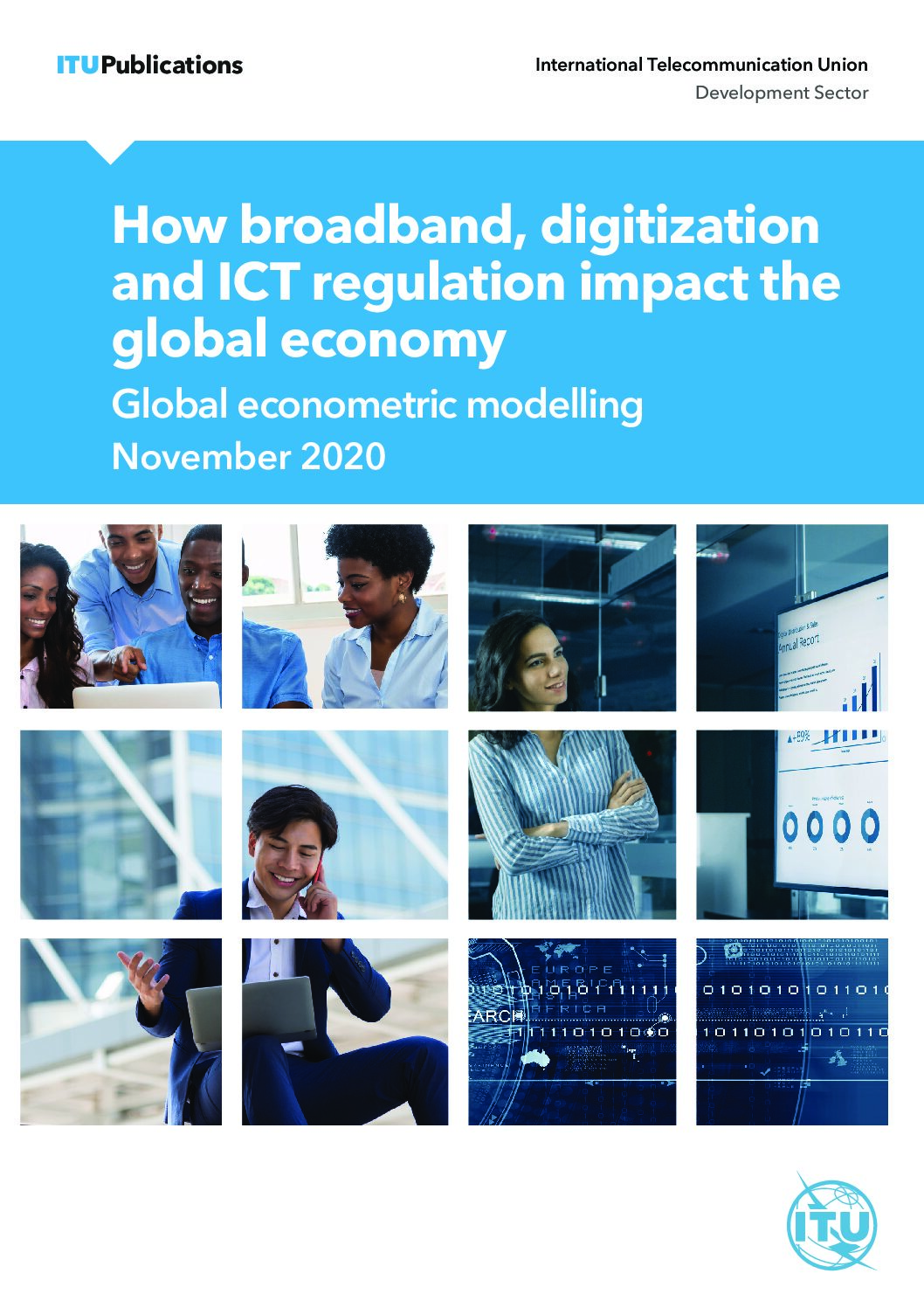
As the global economy reels from the shock of COVID-19, decisions taken now that impact economic recovery and growth will be of the utmost importance for the decade ahead. For those of us in the global ICT community and for those in other industries charged with making strategic infrastructure decisions in the years ahead government policy-makers, regulators, influencers, operators and service providers this expert report is especially valuable at this time. Its findings are clear and its recommendations are specific, concrete and practical. The analysis looks at how fixed and mobile broadband as well as digital transformation impact the economy, globally and at regional levels. It also reports on how our institutions and our regulatory approach affect the development of the global digital ecosystem. It is based on the ITU global study on the economic contribution of broadband, digitization and ICT regulation (2018), and related regional econometric modelling studies each of which adds a rich and detailed regional dimension. The data set that lies at the heart of this work is world class global, up-to-date and robust. Table of contents How broadband, digitization and ICT regulation impact the global economy Global econometric modelling Foreword List of tables and figures Executive summary: How broadband and digitization impact the global economy 1 Fixed broadband and its impact on the economy 1.1 Impact of fixed broadband at global and regional levels 1.2 What the modelling showed globally and by region 2. Mobile broadband and its impact on the economy 2.1 Impact of mobile broadband at global and regional levels 2.2 What the modelling showed globally and by region 2.3 Fixed vs. mobile broadband – economic impact by level of development 3 The economic impact of digitization 3.1 An index to measure the development of digital ecosystems: 8 pillars, 64 indicators 3.2 Digitization correlates with economic development 3.3 Digitization – on par with mobile broadband in boosting economies 4 Policy and regulation drive development of digitization Annex A: Review of the related research literature Annex B: Countries analysed for economic impact of fixed and mobile broadband Annex C: Data sources for models testing the economic impact of fixed and mobile broadband Annex D: Indicators included in the Digital Ecosystem Development Index and data sources Annex E: Econometric methodology Acronyms Bibliography
Read More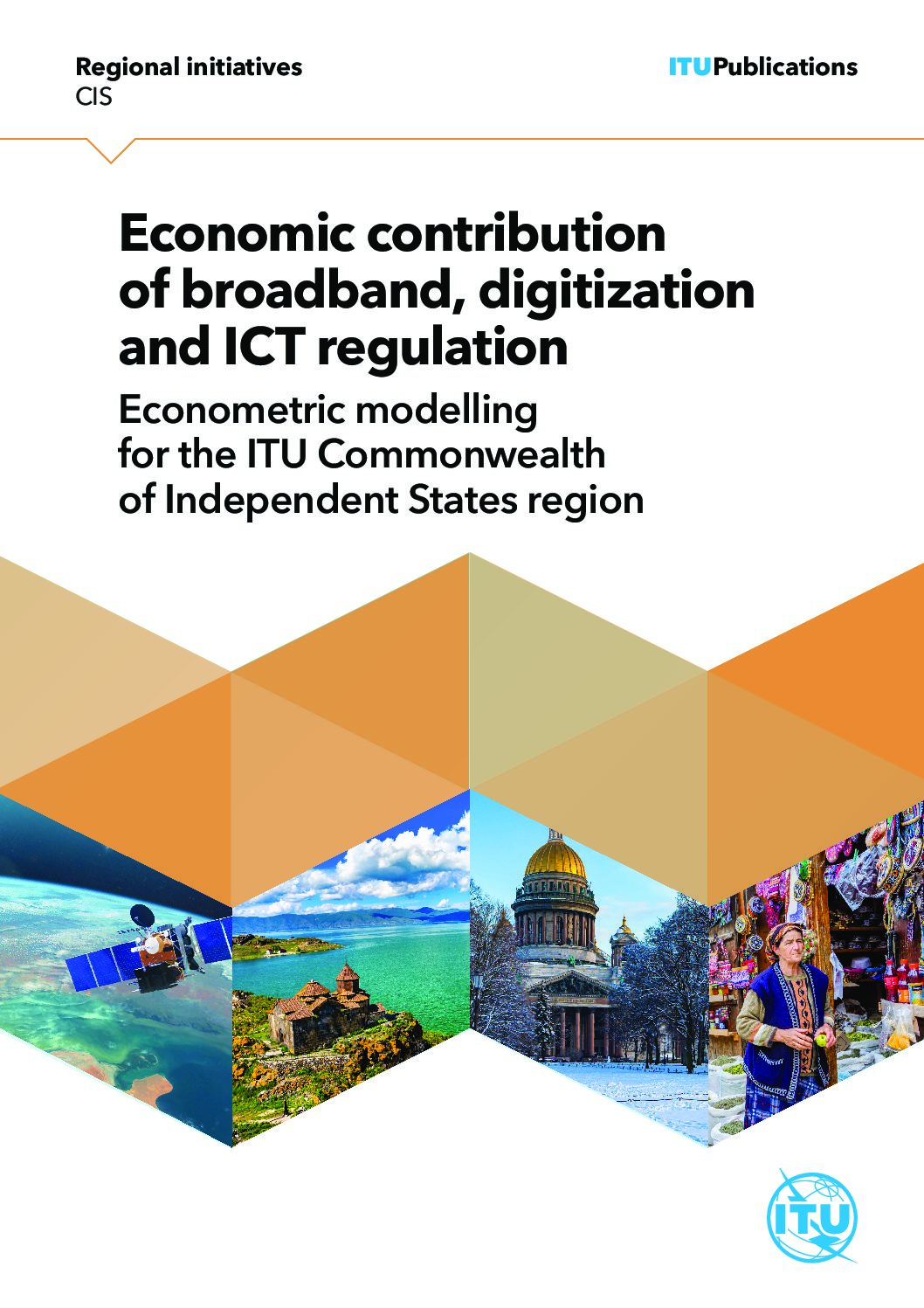
This study focuses on the impact of broadband, digital transformation and policy and regulatory frameworks on the growth of markets for digital services in the CIS region. It provides evidence of the importance of regulatory and institutional variables in driving digital growth and further illustrates how broadband technologies combined with effective ICT regulation can positively impact the growth of national economies and prosperity. The results from this study could assist countries in conceptualizing the process of launching evidence-based digital transformation strategies.
Read More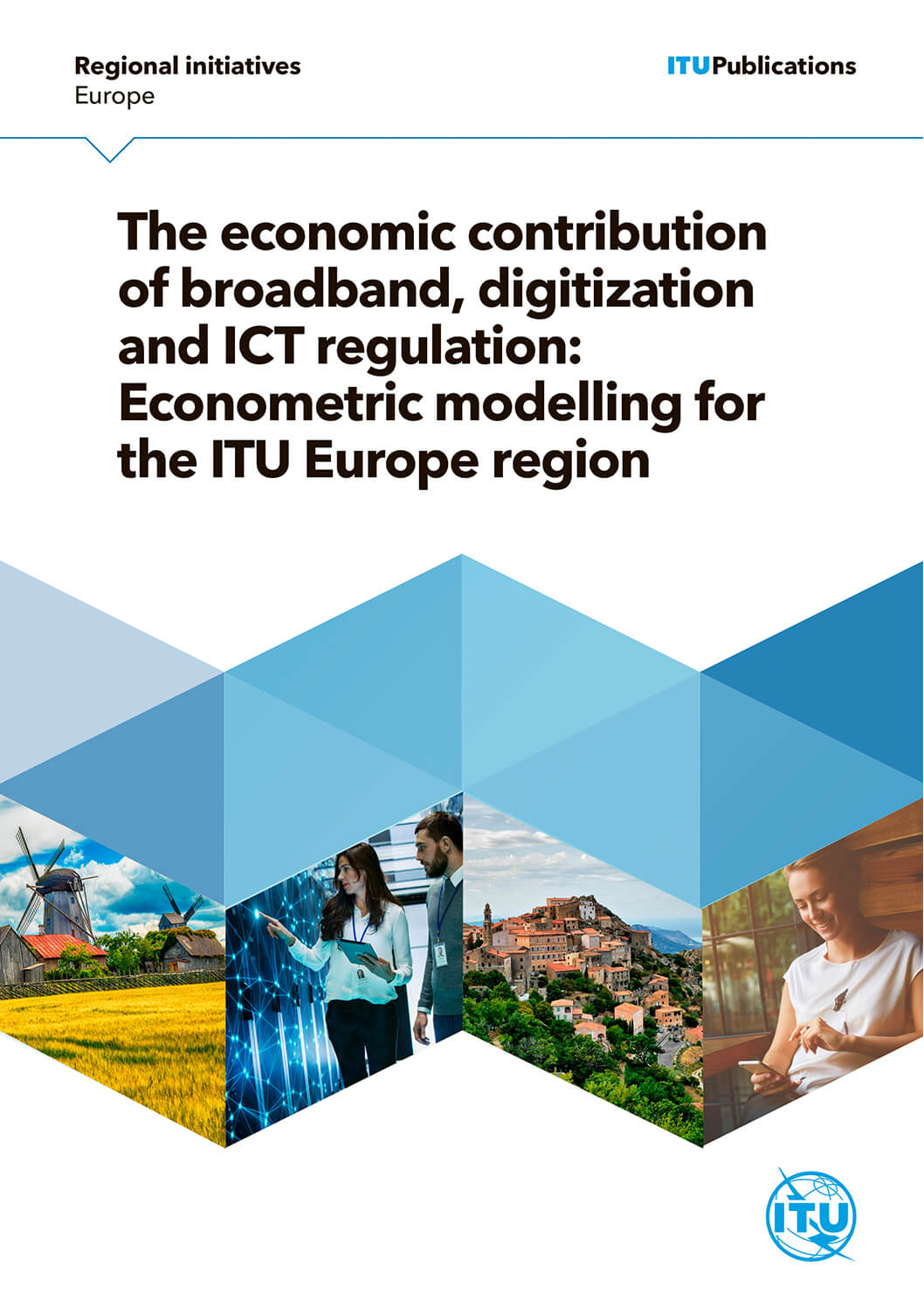
This study focuses on the impact of broadband, digital transformation and policy and regulatory frameworks on the growth of markets for digital services in the Europe region. It provides evidence of the importance of regulatory and institutional variables in driving digital growth and further illustrates how broadband technologies combined with effective ICT regulation can positively impact the growth of national economies and prosperity. The outcomes of this regional study may serve as key reference material to illustrate the impact of fixed and mobile broadband on the economy, where the regions stand in terms of digitization and the impact of digitization on GDP. The results from this study could assist European countries in conceptualizing the process of launching evidence-based digital transformation strategies.
Read More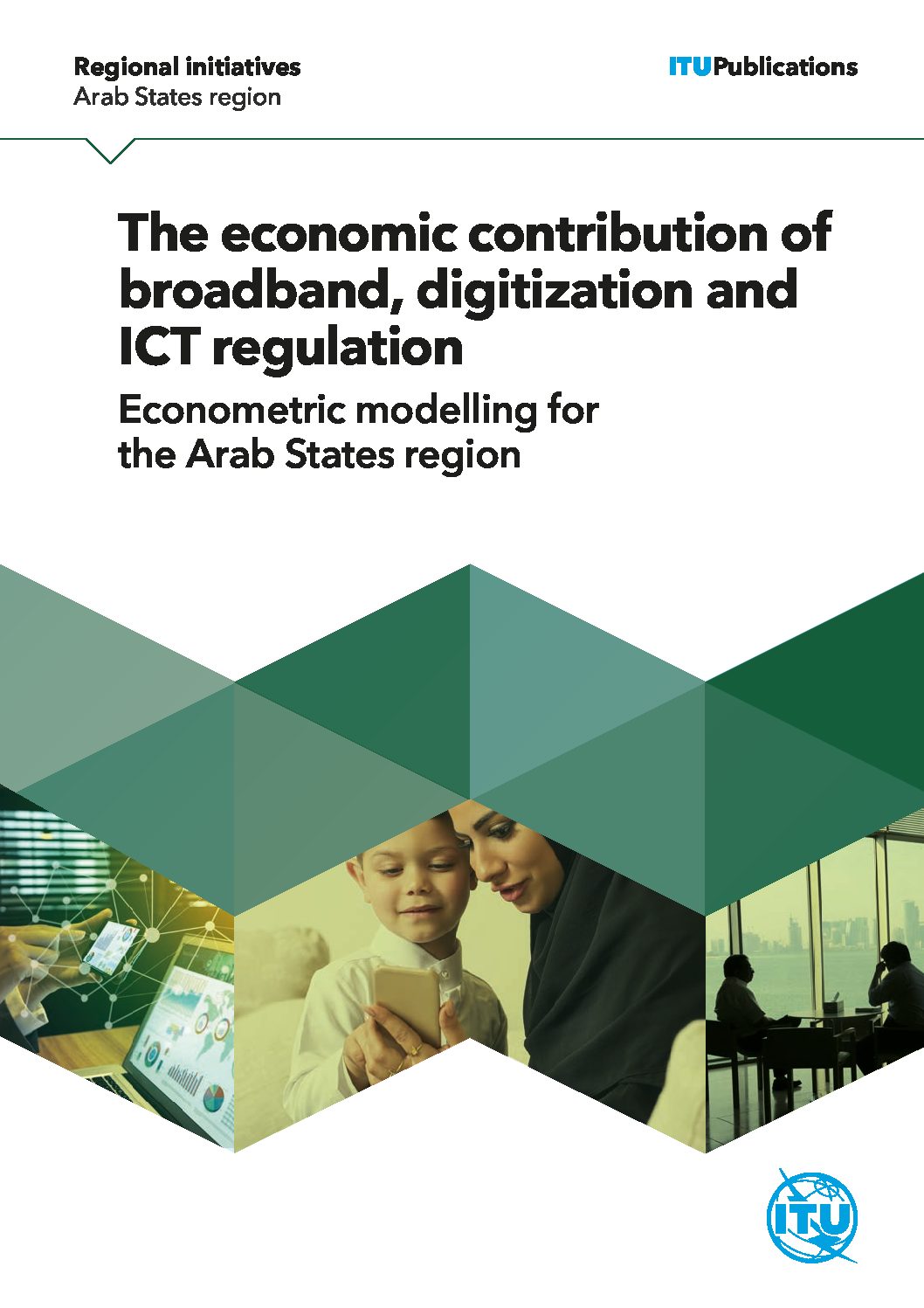
The transformative power of digital technologies and connectivity is empowering people, creating an environment that nurtures innovation, and is triggering positive change in business processes and in the global economy. The recent ITU global study on the economic contribution of broadband, digitization and ICT regulation provided a global econometric analysis of robust and reliable data resources to measure the impact of fixed and mobile broadband and digital transformation on the economy as a whole. It also analysed the impact of institutional and regulatory variables to the development of the digital ecosystem. Based on the data and analysis to measure the impact of digitization as a whole, a further need was identified to conduct studies that delved deeper into these effects, focusing on specific regions of the world. By applying the same methodologies and econometric models used for assessing global effects, this ITU report focuses on the impact of broadband, digital transformation and policy and regulatory frameworks on the growth of markets for digital services in the Arab States region. Table of contents The economic contribution of broadband, digitization, and ICT regulationEconometric modelling for the Arab States region Acknowledgements Foreword Table of Contents 1 Introduction 2 The effects identified on a global scale 2.1 Economic impact of fixed broadband 2.2 Economic impact of mobile broadband 2.3 Economic impact of digitization 2.4 Impact of policy and regulatory framework on digitization development 3 The economic contribution of broadband and digitization and the impact of policy on digitization in the Arab States region 3.1 Review of the research literature 3.2 Hypotheses 3.3 Economic impact of fixed broadband 3.4 Economic impact of mobile broadband 3.5 Economic impact of digitization 3.6 Impact of policy and regulatory framework on digitization 4 Conclusion Annex A: List of data sources for models testing the economic impact of fixed and mobile broadband Annex B: Indicators included in the CAF Digital Ecosystem Development Index and data sources Bibliography
Read More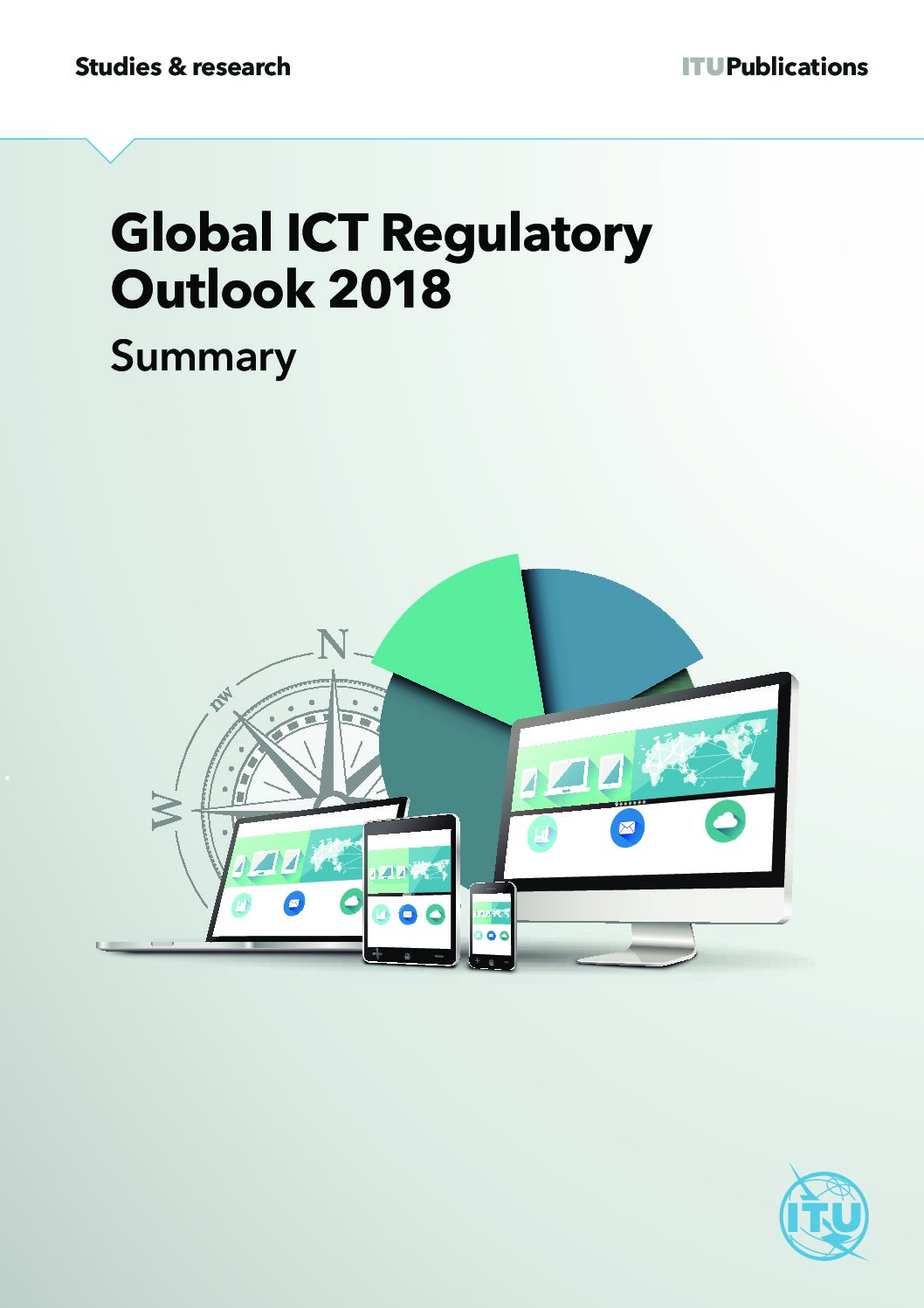
This edition of the Global ICT Regulatory Outlook builds on its predecessor first edition. New this year is unique evidence from around the world charting the evolution of policy and regulation in ICTs and, by extension, in the digital economy. This is an exciting time for regulators and what they need more than ever, is detailed evidence to support their decision making, enabling them to lead the way in digital transformation with confidence. This report is based on inputs from 190 countries and offers an objective/neutral perspective on the latest trends driving ICT policy and regulation. Regulatory topics are explored through factual graphic analysis and complemented by country experiences. This powerful combination enables us to decipher complex, multi faceted issues and make sense of the rich body of regulatory experience from all regions. While some findings are intuitive, others offer surprises. Table of contents Global ICT Regulatory Outlook 2018 Summary Introduction The state of ICT regulation globally Policy and regulatory trends Policies for digital Digital platform regulation Taxation in the digital ecosystem Collaborative regulation: reaching the next frontier together Regulatory thinking cycle 2.0 Regulatory collaboration: ‘power coupling’ Five vectors defining the future of regulation
Read More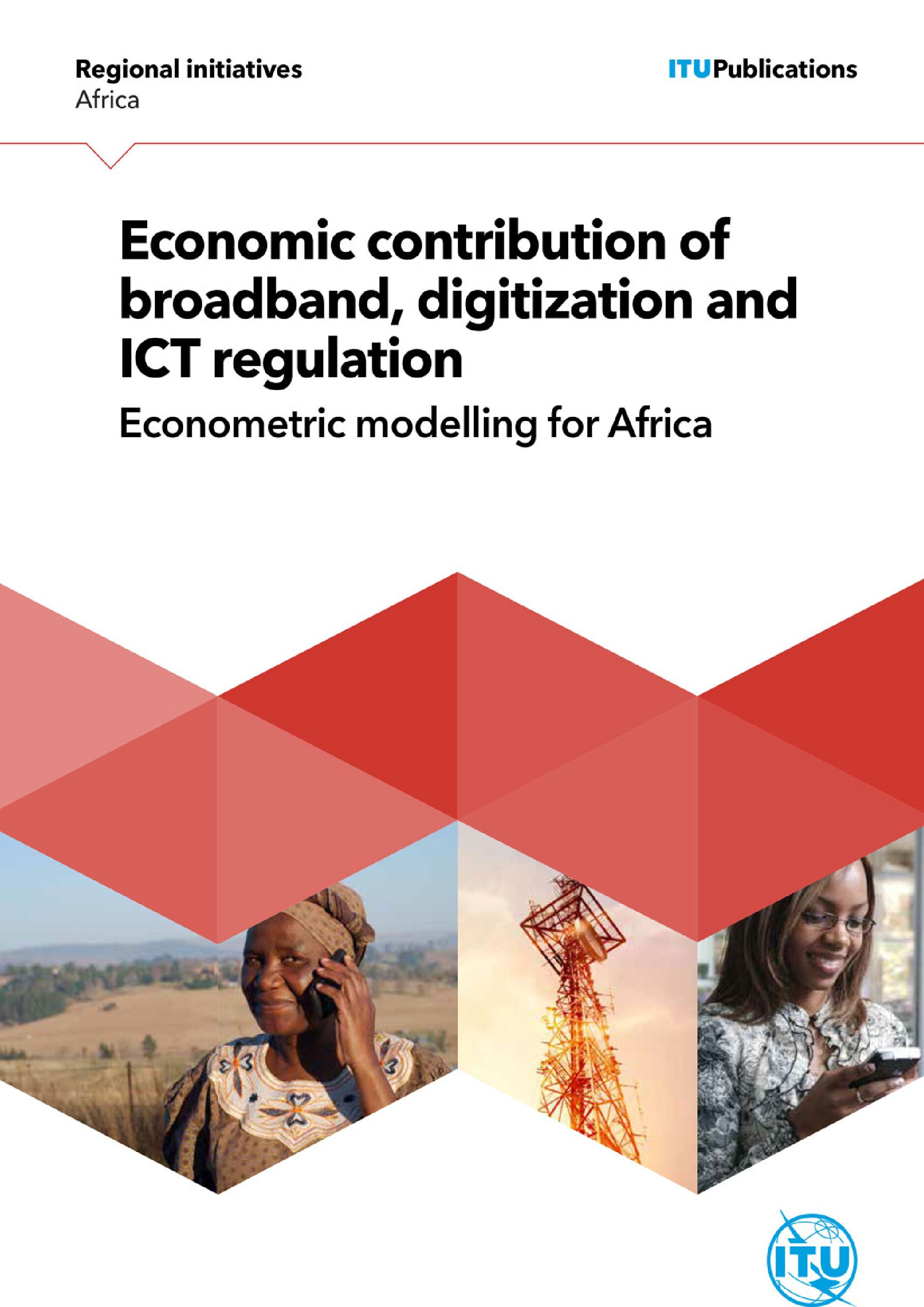
The transformative power of digital technologies and connectivity is empowering people, creating an environment that nurtures innovation, and is triggering positive change in business processes and in the global economy. The recent ITU study on the economic contribution of broadband, digitization and ICT regulation pro- vided a global econometric analysis of robust and reliable data resources to measure the impact of fixed and mobile broadband and digital transformation on the economy as a whole. It also analysed the impact of institutional and regulatory variables to the development of the digital ecosystem. Based on the data and analysis to measure the impact of digitization as a whole, a further need was identified to conduct studies that delved deeper into these effects, focusing on specific regions of the world. By applying the same methodologies and econometric models used for assessing global effects, this report focuses on the impact of broadband, digital transformation and policy and reg- ulatory frameworks on the growth of markets for digital services in Africa. It also provides evidence of the importance of regulatory and institutional variables in driving digital growth, illustrating that broadband technologies and effective ICT regulation can have positive impacts on the development of national economies and prosperity. Table of contents Economic contribution of broadband, digitization and ICT regulation: Econometric modelling for Africa Acknowledgements Foreword 1 Introduction 2 The effects identified on a global scale 3 The economic contribution of broadband and digitization and the impact of policy on digitization in Africa 3.1 Review of the research literature in Africa 3.2 Hypotheses 3.3 Economic impact of fixed broadband in Africa 3.3.1 Data 3.3.2 Model results and discussion 3.4 Economic impact of mobile broadband in Africa 3.4.1 Data 3.4.2 Model results and discussion 3.5 Economic impact of digitization in the Africa region 3.5.1 Data 3.5.2 Model results and discussion 3.6 Impact of policy and regulatory framework on digitization in Africa 3.6.1 Data 3.6.2 Model results and discussion 4 Conclusion Annex A: List of data sources for models testing the economic impact of fixed and mobile broadband Annex B: Indicators included in Digital Ecosystem Development Index and data sources Bibliography
Read More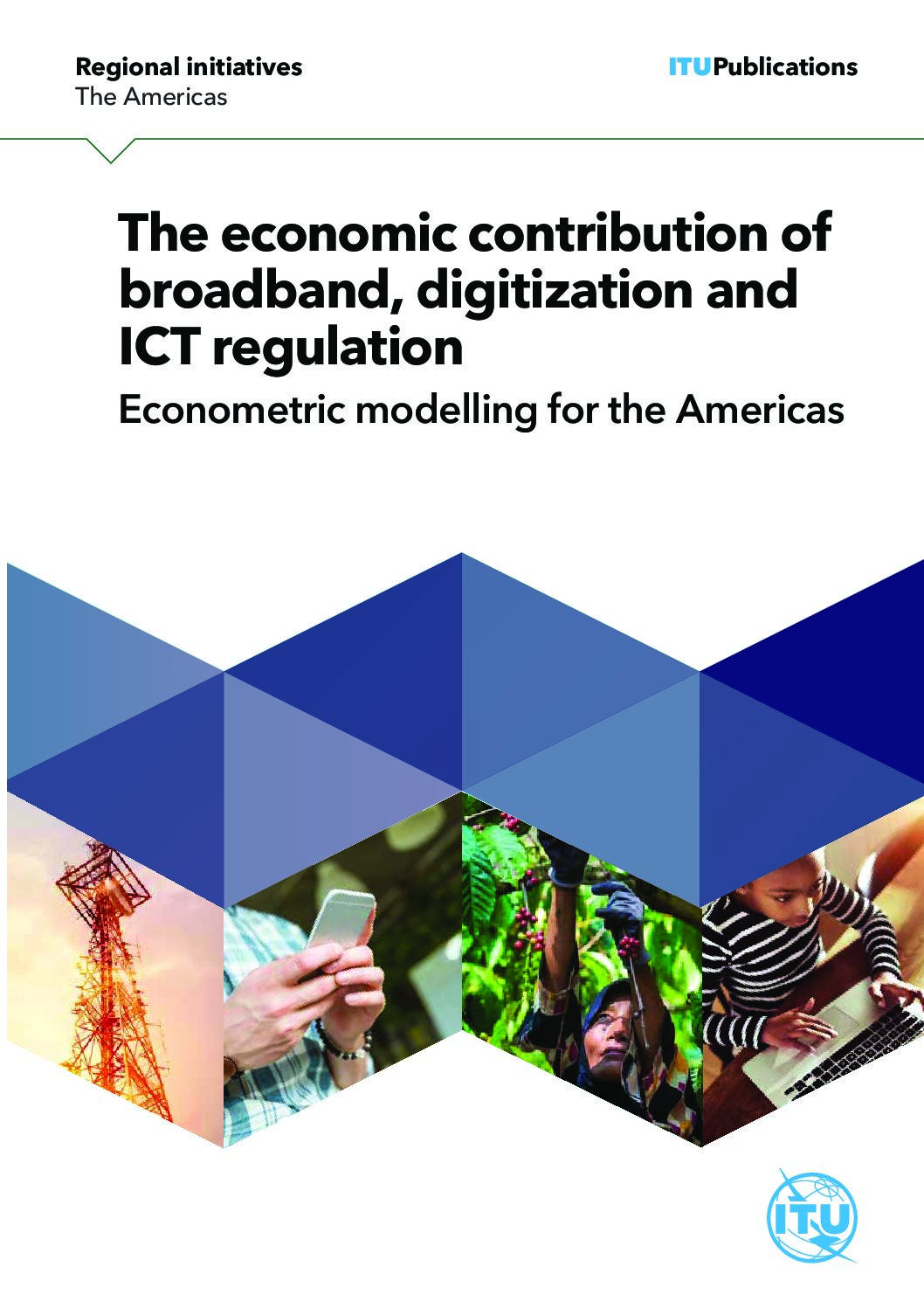
The transformative power of digital technologies and connectivity is empowering people, creating an environment that nurtures innovation, and is triggering positive change in business processes and in the global economy. The recent ITU study on the economic contribution of broadband, digitization and ICT regulation pro- vided a global econometric analysis of robust and reliable data resources to measure the impact of fixed and mobile broadband and digital transformation on the economy as a whole. It also analysed the impact of institutional and regulatory variables to the development of the digital ecosystem. Based on the data and analysis to measure the impact of digitization as a whole, a further need was identified to conduct studies that delved deeper into these effects, focusing on specific regions of the world. By applying the same methodologies and econometric models used for assessing global effects, this study focuses on the impact of broadband, digital transformation and policy and regulatory frameworks on the growth of markets for digital services in the Americas region. Table of contents The economic contribution of broadband, digitization and ICT regulation: Econometric modelling for the Americas Foreword Table of Contents 1 Introduction 2 The effects identified on a global scale 3 The economic contribution of broadband and digitization and the impact of policy on digitization in the Americas region 3.1. Review of the research literature 3.1.1. Economic impact of broadband: United States of America 3.1.2. Economic impact of broadband and digitization in Latin America and the Caribbean 3.2. Hypotheses 3.3. Economic impact of fixed broadband in the Americas region 3.3.1. Data 3.3.2. Model results and discussion 3.4. Economic impact of mobile broadband in the Americas region 3.4.1. Data 3.4.2. Model results and discussion 3.5. Economic impact of digitization in the Americas region 3.5.1. Data 3.5.2. Model results and discussion 3.6. Impact of policy and regulatory framework on digitization in the Americas region 3.6.1. Data 3.6.2. Models results and discussion 4 Conclusion Annex A: List of data sources for models testing the economic impact of fixed and mobile broadband Annex B: Indicators included in CAF Digital Ecosystem Development Index and data sources Bibliography
Read More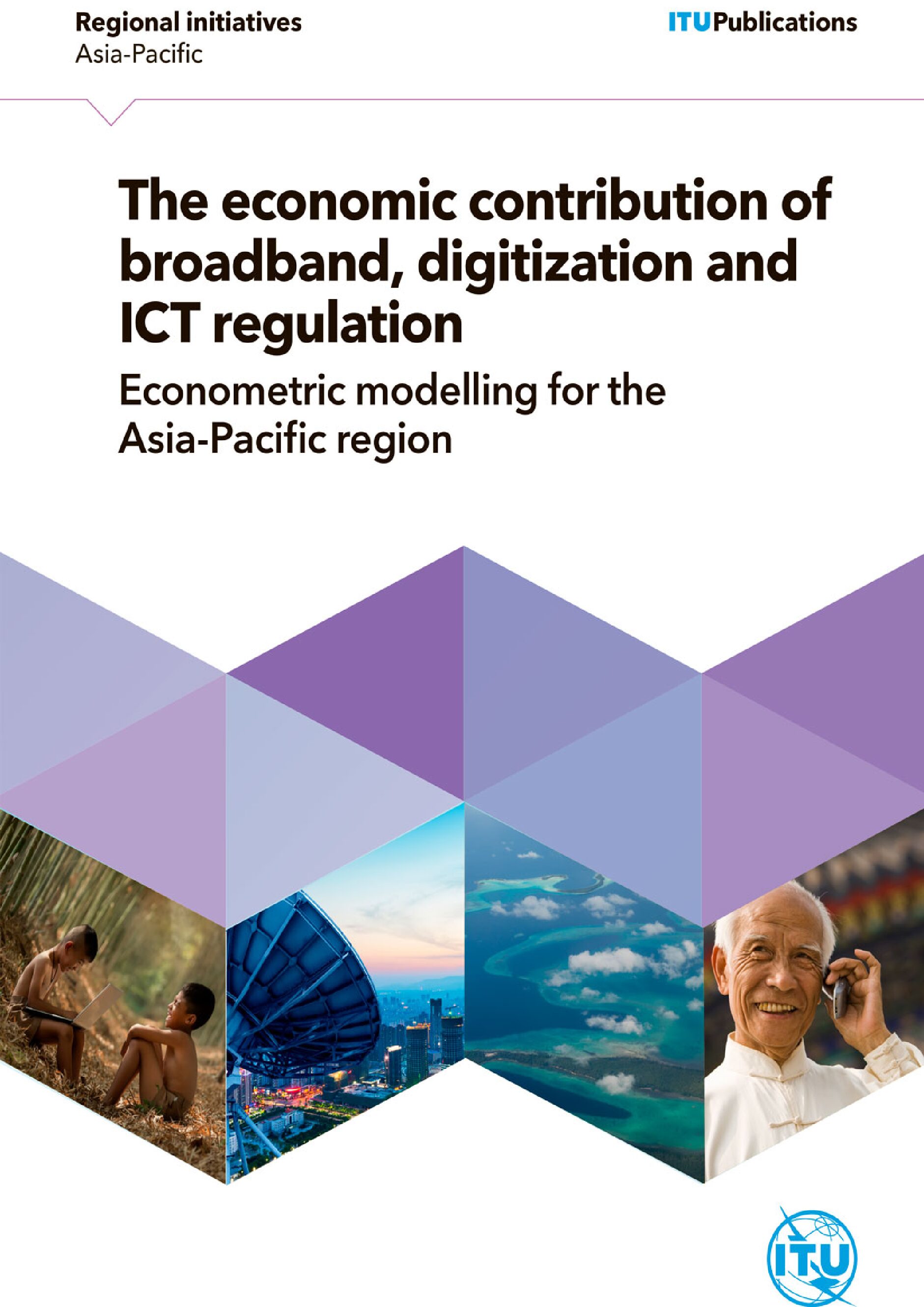
The transformative power of digital technologies and connectivity is empowering people, creating an environment that nurtures innovation, and is triggering positive change in business processes and in the global economy. The ITU study on the economic contribution of broadband, digitization and ICT regulation provided a global econometric analysis of robust and reliable data resources to measure the impact of fixed and mobile broadband and digital transformation on the economy as a whole. It also analysed the impact of institutional and regulatory variables to the development of the digital ecosystem. Based on the data and analysis to measure the impact of digitization as a whole, a further need was identified to conduct studies that delved deeper into these effects, focusing on specific regions of the world. By applying the same methodologies and econometric models used for assessing global effects, this study focuses on the impact of broadband, digital transformation and policy and regulatory frameworks on the growth of markets for digital services in the Asia-Pacific region. It also provides evidence of the importance of regulatory and institutional variables in driving digital growth, illustrating that broadband technologies and effective ICT regulation can have positive impacts on the development of national economies and prosperity. Table of contents The economic contribution of broadband, digitization and ICT regulation Econometric modelling for the Asia-Pacific region Acknowledgements Authors Foreword 1 Introduction 2 The effects identified on a global scale 2.1 Economic impact of fixed broadband 2.2 Economic impact of mobile broadband 2.3 Economic impact of digitization 2.4 Impact of policy and regulatory framework on digitization development 3 The economic contribution of broadband and digitization and the impact of policy on digitization in the Asia-Pacific region 3.1 Review of the research literature 3.2 Hypotheses 3.3 Economic impact of fixed broadband in the Asia-Pacific region 3.4 Economic impact of mobile broadband in the Asia-Pacific region 3.5 Economic impact of digitization in the Asia-Pacific region 3.6 Impact of policy and regulatory framework on digitization in the Asia-Pacific region 4 Conclusion Annex A: List of data sources for models testing the economic impact of fixed and mobile broadband Annex B: Indicators in the Digital Ecosystem Development Index and data sources Bibliography
Read More